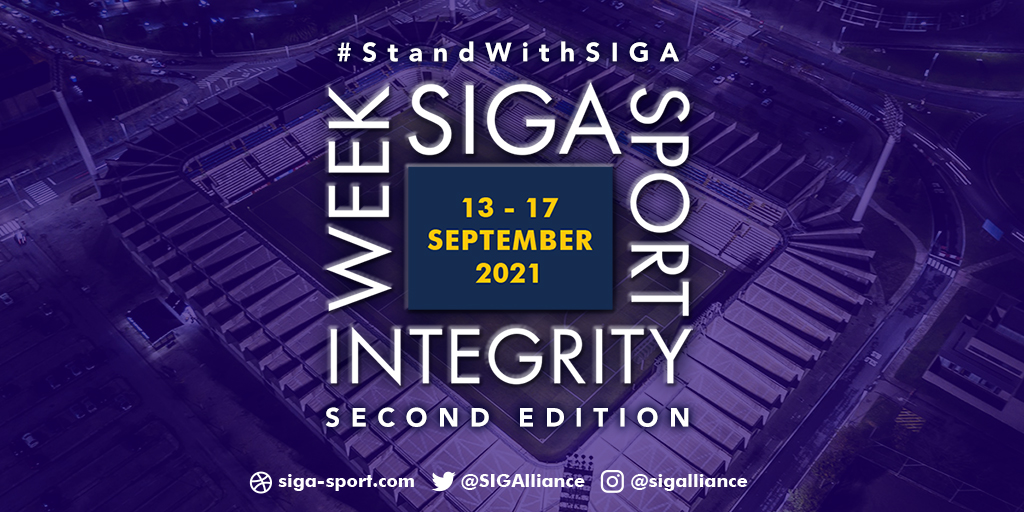As part of SIGA’s Sport Integrity Week, a panel of experts shared their views on gender, race, inclusion and diversity. Sport is for everyone afterall.
“Many of the leading sports bodies and organisations are superficial, are paid to tick the box, and take steps to address gender, race, inclusion and diversity merely from a public relations perspective,” began Brian Lewis in his keynote introduction. “And they don’t produce the change that is absolutely necessary,” he added with concern.
That’s where SIGA comes in, and AS is a proud media partner supporting good practices in the sporting world, because, as director Vicente Jiménez conveys, “without integrity there is no sport.” Sport on the field of play has the power to move the needle and break multiple boundaries. But the pace of change is slow when it comes to its leadership, with a lack of diversity at the top negatively impacting the way sport is governed. SIGA’s Universal Standards on Good Governance in Sport and its first independent audit system, SIRVS, are the game changer that the industry needs.
Our moderator for this hugely important topic, Karin Korb, is a top athlete in her own right starring for the US Paralympic team, and speaking from New Jersey she posed some interesting questions in the direction of the panel. As she highlights, every single one of them, and many others, are “working towards sport being truly for all.”
Opportunity, equality and lived experience
“Equity of opportunity is a fundamental right,” began former professional soccer player, Paul Elliot, who now chairs the English FA’s Inclusion Advisory Board. Over the 20-plus years that he’s been working in this field, he has found himself sitting in many a boardroom and looking around to find he’s the only non-white face. Using that experience, as well as the discrimination aimed in his direction, he says, is key to being able to take others on the journey to creating equal opportunity for all.
As Paul points out, there is around a third of players on the pitch in England from Black, Asian or mixed heritage but at an organisational management level you can count their representation on one hand. And the same applies to coaching in the game. His role is to change the culture in sport and in the wider society.
This idea of ‘lived experience’ is something that was shared by others on the panel. Renee Brown, a leader in diversity and inclusion at the WNBA, has worked with women all across the globe, and says that people must educate themselves on their specific situation and define their values both morally and from a business perspective. From this understanding you will be able to bring others together and explain more clearly what the mission is and the reasons behind it.
“Don’t look to Black people to tell you what is needed,” she says. “Look around your own leadership team. What voices are missing?”
Be a disruptive force
That idea of getting heard in the decision making process was something Danielle Obe could really relate to. “Solution number one: be ready to be a disrupting force,” the Co-Founder & Chair of the Black Swimming Association put forward powerfully.
“The BSA weren’t being heard,” she explained of their previous struggles of making a difference to the massive discrepancy in swimming access opportunities for those of African and Caribbean heritage especially, “so we brought our chair to the table and said, ‘scoosh around, we want to have our say.’”
A common theme of the session was the constant fight to be heard, something that has clearly improved hugely but needs much more work, but Jamil Northcutt was also keen to highlight the need for ‘altruism’ in the ongoing efforts, “extending love and kindness to others.”
Health, relationships and finances
Jamil liked to make people think of a three-legged table, with each leg standing for health, relationships and finances. As part of his work on player engagement for Major League Soccer, he says the importance lies in managing people’s mental health, treating people the right way, and building more diversity to help financial stability. If any of these are weak, the table falls over. Equity is required across the board.
As Danielle concluded, “Be strong enough to stand until change is made.” And there is little doubt after listening to these panelists that they will continue with passion along this path.
The Sport Integrity Week™ is aimed at promoting the implementation of the highest integrity standards at all levels and across all areas of Sport.
Bringing together relevant industry leaders, decision-makers and top experts, the Sport Integrity Week™ will offer a unique, powerful platform to raise awareness about the most critical challenges facing Sport and the wider industry, facilitate collective action and pave the way to the necessary reforms.
The 2021 Sport Integrity Week™ will take place on an engaging digital platform allowing you to network with like minded peers. The week comprising of live interactive panel discussions via SIGA’s Online Event Platform will host a series of interviews with some of the most senior leaders from the world of Sport.
Structured around 5 core themes, the Sport Integrity Week™ will offer insightful discussions, knowledge sharing and networking opportunities. It will also promote best practice, enhance dialogue and cooperation, as well as instigate cultural, global approaches and action-oriented solutions.

